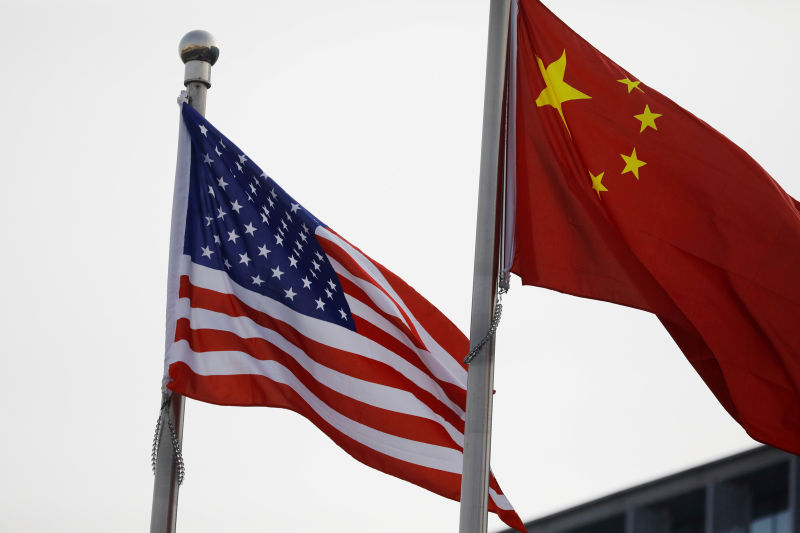China ride-hailing giant Didi Global’s shares plunged more than 22% in the US on Friday, losing about $8.4 billion in market value, to end a week in which the decoupling of the equity markets of the world’s two biggest economies gathered pace.
The plunge followed Didi’s announcement that it planned to delist from the New York Stock Exchange less than six months after its bumper $4.4 billion IPO there. Didi’s decision followed China’s swinging crackdown on tech companies amid its concerns that reams of customer data risked falling into foreign hands, and a US decision to boot 248 Chinese companies off its exchanges for failing to comply with auditing requirements.
American investors in Chinese stocks listed in the US have some $1.1 trillion at risk as the decoupling of their equity markets accelerates. The Nasdaq Golden Dragon China Index plunged more than 9% Friday as investors braced for more China stock delistings. It’s down almost 43% this year, wiping more than $1 trillion off the value of Chinese stocks in the US.
“It actually sounds the death knell of all Chinese stocks in America,” tweeted Dan Harris, a lawyer with Harris Bricken in Seattle and co-author of the China Law Blog. “It is yet another example of how China is decoupling from the West, oftentimes of its own accord.”
Read More: Chinese Stocks Delisting From the US: 25 On the Brink
Didi said it planned to withdraw its New York Stock Exchange listing and shift to Hong Kong. Its decision came amid pressure from China policymakers over concerns about the security of its data if it was exposed to US auditing norms. China issued new regulations since July that prohibit Chinese companies from complying with US audit requests.
US Set to Lose $2.1 Trillion From China Delistings
The US is set to lose 248 Chinese companies with a combined market capitalisation of about $2.1 trillion, or almost 4% of the value of all companies listed on US exchanges. China will lose access to the world’s biggest capital market, which has raised more than $100 billion for its companies to modernize and help upgrade their governance and management standards.
The US securities regulator advanced rules on Thursday to force Chinese companies to comply with a law passed by Congress in December last year that demands they open their books for audits. If they do not, the Securities and Exchange Commission must now delist them within three years.
“If you want to issue public securities in the U.S., the firms that audit your books have to be subject to inspection by the Public Company Accounting Oversight Board (PCAOB),’’ said SEC Chair Gary Gensler in a statement on Thursday. “While more than 50 jurisdictions have worked with the PCAOB to allow the required inspections, two historically have not: China and Hong Kong.’’
Under the rules, foreign companies will also be required to disclose the level of their foreign government ownership, Gensler said. The US is set to lose Chinese companies with a combined market capitalisation of about $2.1 trillion, or almost 4% of the value of all companies listed on US exchanges. China will lose access to the world’s biggest capital market, which has raised more than $100 billion for its companies to modernize and help upgrade their governance and management standards.
MORE ON AF: China Stocks Delisting From US: Everything You Need to Know
Previous Delistings Hurt Investors
Previous delistings provide the best window on what the future may hold for investors – and it doesn’t look good. In late 2017, China-based and US-listed Qihoo 360 announced a deal to be taken private by a group of investors led by its CEO, Zhou Hongyi, who held a 61% majority stake in the company.
The deal valued Qihoo at about $9.3 billion. It was then relisted on the Shanghai stock exchange, where its market cap soared to $56 billion. In a 2019 article published in the Harvard Law School Forum on Corporate Governance, Harvard Law School professor Jesse Fried and Burford Capital’s Matthew Schoenfeld assert that Qihoo’s CEO alone made $12 billion in the relisting exercise.
”Beijing may be deliberately tanking these companies’ shares to pave the way for Chinese investors to acquire interests at lower prices,” they said.
Similarly, shares in state-run China Telecom had traded in the high $40 to low $50 range from 2016 to 2019, but slid after former President Donald Trump signed an executive order forcing companies deemed tied to China’s military to delist from US exchanges. China Telecom shares had plunged to $27.51 on the day it was delisted from the New York Stock Exchange.
While US investors who held shares once worth up to $50 each were left holding the bag by the delisting, China Telecom appears to not have suffered much. Only months after the US delisting, the company announced plans to raise $7.3 billion in a Shanghai listing, a 90% premium to the trading price for its shares listed on the Hong Kong stock exchange.
US and Chinese markets are deeply intertwined. The Rhodium Group estimates US and Chinese investments in each other’s stock and bond markets totalled as much as $3.3 trillion as of the end of 2020. US investors own about $1.1 trillion in Chinese stocks and about $100 billion in debt instruments. Chinese holdings of US treasuries alone total about $1.1 trillion.
- By Kevin Hamlin
ALSO ON AF:
China Stocks Delisting From US Puts $1.1 Trillion at Risk
Alibaba Among Top Six China Stocks Worth $1tn Facing US Delisting
























